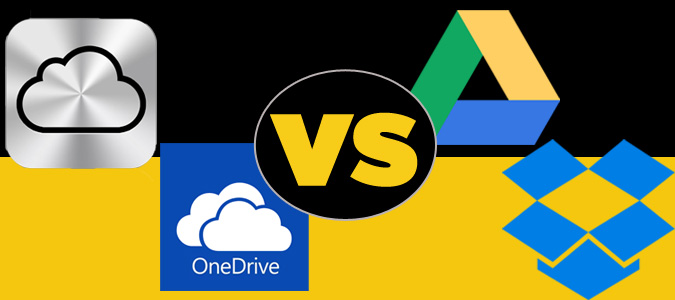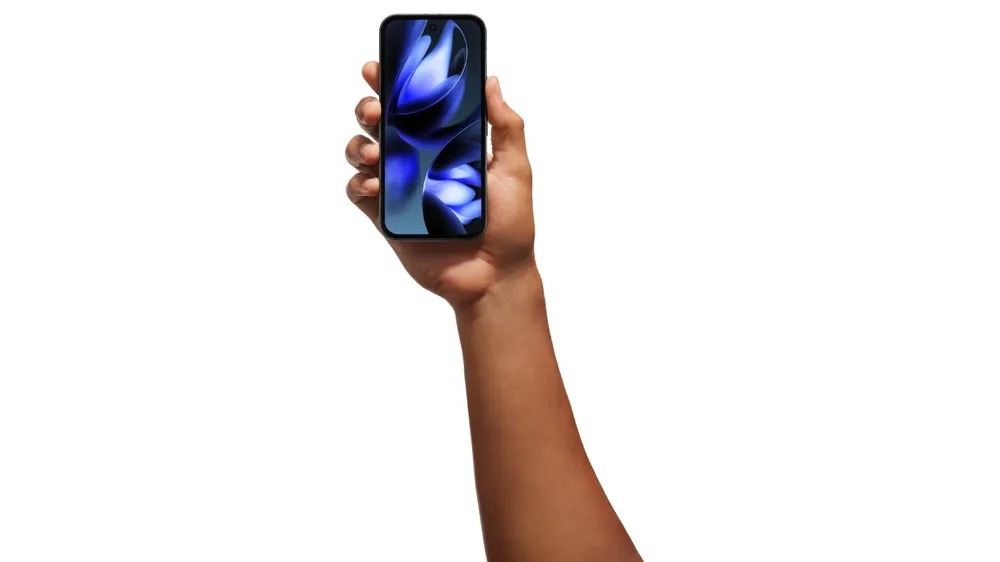iCloud vs. Google Drive vs. OneDrive vs. Dropbox

There's an estimated 1 exabyte worth of data being stored in the cloud. That's more than 1 million gigabytes. So it's little wonder all the major names are constantly evolving their services, hoping to keep users and attract new ones. With the announcement of new pricing for its iCloud service, Apple hopes to keep the iOS faithful backed up everywhere, and possibly lure more folks to its side. But Apple still must compete with Dropbox, Google and Microsoft, just to name a few.
So which cloud service is the best deal? Here's our pricing breakdown.
MORE: iOS 8: Top 10 New Features
Pricing
To help you pick the right cloud service, let's start by examining the basics of what each service offers. What exactly do you get for your money? Note: Apple's new iCloud pricing won't take affect until this fall.
| Row 0 - Cell 0 | Apple iCloud (current) | Apple iCloud (future) | Microsoft OneDrive | Google Drive | Dropbox |
| Free | 5GB | 5GB | 15GB (8GB bonus for signing up) | 15GB | 2GB free (up to 16GB with referrals) |
| 20GB | $3.33/month or $40/year | $0.99/month | Free with Office 365 subscription ($6.99 per month) | Not Available | Not Available |
| 50GB | $8.33/month or $100/year | Not Available | $2.08/month or $25/year | Not Available | Not Available |
| 100GB | Not Available | Not Available | $4.16/month or $50/year | $1.99/month | $9.99/month |
| 200GB | Not Available | $3.99/month | $8.33/month or $100/year | Not Available | $19.99/month or $199.99/year |
| 1TB or higher | Not Available | Unannounced | OneDrive for business/$2.50 per user/month | $9.99/month | $15 per user/month for unlimited storage |
| Platforms | Windows, Mac, iOS | Windows, Mac, iOS | Windows, Mac, Android, iOS, Win Phone | Windows, Mac, Android, iOS | Windows, Mac, Android, iOS |
If free is the right price for your online storage needs, you're best bets are Google Drive or Microsoft OneDrive. Dropbox could be great -- 16GB beats everyone -- but to get all that space you'll need to refer 28 other people to try Dropbox.
Apple offers a 20GB option of cloud storage. So if that is your sweet spot it will cost you $0.99 per month. Microsoft offers this amount free with an Office 365 subscription, but that costs at least $6.99 per month for one person. With the next tier up -- 50GB -- Apple gets some competition from Microsoft. But Microsoft's service is so much cheaper at $25.
Google, Microsoft and Dropbox all compete in the 100GB space, with the best deal going to Google Drive at $1.99 per month. But for 200GB you'll get the best price per gigabyte from Apple's new iCloud pricing structure, which will run you $3.99 per month. Google and Dropbox don't offer options in this size range.
Stay in the know with Laptop Mag
Get our in-depth reviews, helpful tips, great deals, and the biggest news stories delivered to your inbox.
Once you get to the 1TB range, you get much more business-focused plans. Google offers 1TB for 9.99 a month. Onedrive (coming soon) and Dropbox instead charge based on the number of total users at $2.50 and $15 per user respectively. Apple has not yet announced a price for its 1TB option.
Features

iCloud
The current services offered by iCloud include photo and content sharing, Find my iPhone, iWork integration, iCloud Keychain and backups for mail, calendar, contacts and storage. More features are coming in the fall with iCloud Drive and iOS 8, promising drag and drop syncing, simultaneous multi-app editing and family sharing. This will also coincide with better prices and options for storage and more robust sharing features, especially for iOS users. However, there is no support for Android, at least not yet.

Google Drive
Google's cloud services feature a combination of cheap storage and office production software for creating documents, presentations, spreadsheets, forms, drawings and folders with simple sharing. Their free Google Drive app adds drag and drop syncing and the flexibility to continue working even when offline. Drive is also integrated with Gmail for seamless saving of files and attachments. One unique feature for Drive will help you go paperless by allowing your Android device to scan documents and automatically convert them to PDFs. Photo and media sharing is possible, but better when paired with partner apps like Picasa and Google+.

OneDrive
Microsoft's cloud solution is most similar to Google Drive, in that it also offers storage combined with integration of their Office suite for online and offline editing, co-authoring and syncing. Microsoft does make considerations for photo sharing with online and email slideshow but pale in comparison to more mainstream photo apps. Since OneDrive is built into Windows 8, users also have exclusive access to features like smart syncing, camera roll and PC backup and Windows Store integration. The 20GB of storage on OneDrive comes free with a subscription to Office 365 (starting at $6.99 per month for 1 person).

Dropbox
Dropbox does one thing and does it well. It provides virtual synced storage that will hold anything you put in your folders, for easy sharing and retrieval on any machine. A bonus feature is Dropbox Camera Upload which automatically syncs photos from your camera, phone or tablet through the Dropbox app, PC or Mac. You can upgrade to pro for more storage and business for better support, multi-user management and enhanced security. Like Google and Microsoft, the Dropbox service supports every major platform, including Windows, OS X, iOS, Android and Windows Phone.
Bottom Line
Google Drive is currently the most popular service (who doesn't have a Gmail account?) and makes creating and sharing across every platform a breeze. Microsoft is attempting to get more traction for OneDrive. With the release and integration with Office 365 you can bet the company will be shifting more focus to their cloud services. Google Drive and OneDrive's integration with productivity software separates it from Dropbox.
Dropbox is the simplest cloud service to use and platform agnostic, as its sole purpose is easy-to-use storage and sharing. Apple is taking a somewhat different path with iCloud, combining behind-the-scenes media and document syncing across multiple devices with an upcoming iCloud Drive option that will give users the drag-and-drop and organization features competitors already offer.
- Best Smartphones 2014
- Apple OS X Yosemite: Top 7 New Features
- What's the Fastest Cloud Storage Service
Follow @SamRutherford and on Google+. Follow LaptopMag at @laptopmag, on Facebook and on Google+.
